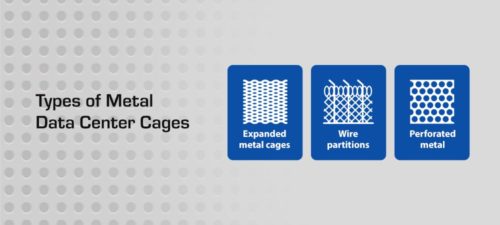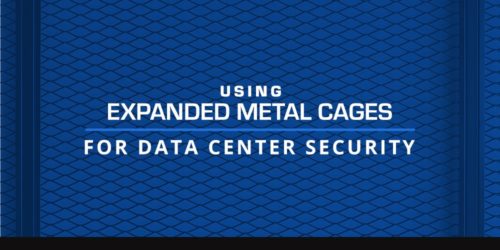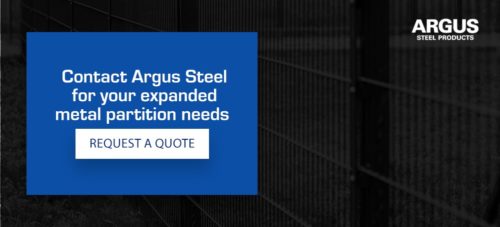Using Expanded Metal Cages for Data Center Security
Leave a CommentData Cages for Server Room Security
As e-commerce and other digital operations continue to expand, data center security has become increasingly important. Data centers are specialized facilities for data processing and remote storage, helping organizations centralize and secure critical information. By housing servers, storage systems and security devices within these centers, businesses can ensure their data remains safe and accessible.
Cybersecurity helps data centers stay protected. However, there’s another important element to security in these settings — data center cages. These metal cages and partitions keep critical systems and servers organized and safely locked. They are an essential component of server physical security.
How Are Data Center Cages Used?
Above all, server cages keep data centers secure. The durable metal and complicated lock systems keep critical data safe and accessible only to the right people, protecting critical computer servers and stored data.
Here are more applications for data center cages:
- Cage colocation: Cages serve as organizational tools by providing a secure, private space for clients renting server space in a colocation facility, ensuring their equipment and data are protected within a shared environment. Alternatively, you might want to keep different systems within the same organization distinctly apart. Cage partitions can keep separate servers or systems apart from each other.
- Control access: You can also control access to servers with metal gates. By using locks or other restrictions on the entrances, only authorized personnel will be able to enter each cage.
- Prevent damage: Cages also protect your servers and data systems. Most are made with mesh metal wiring, allowing for maximum airflow. As air circulates through, it prevents systems from overheating and keeps them functioning properly.
- Disaster recovery and backup systems: Cages help protect backup systems and data recovery equipment by isolating them in secure areas, which are separate from the primary data center infrastructure.
- Regulatory compliance in high-security industries: In finance, healthcare or government, cages safeguard data and hardware in compliance with regulatory requirements for physical security.
Types of Metal Data Center and Server Room Cages

There are multiple types of data center cages, each with its own pros and cons. Here are a few examples:
- Wire cloth cages: This type of data center cage provides security while allowing airflow due to a high percentage of open areas. Hardware generates significant heat, and these openings provide some temperature regulation and ventilation to prevent overheating. Wire cloth comes in welded or woven wire mesh. Welded wire cloth is strong, holds its shape and fits into tight spaces. Woven wire cloth is extremely durable and supports heavy loads.
- Wire partition: This cage style consists of either welded wire mesh or heavy-duty woven mesh. Wire partitions allow it to be made in various dimensions or sizes, depending on someone’s need. It also has the largest openings available of these types. If you have a wire partition set in a metal frame and tack welded, there is no risk of the barrier coming loose.
- Expanded metal cages: Expanded metal is durable. Manufacturers make expanded metal sheets by creating multiple slits in them. They then stretch the sheet to create a diamond pattern with the openings. This structure makes expanded metal sturdy, lasting for years on end.
Regardless of the construction you choose, stainless steel security cages offer exceptional strength, ensuring long-term security and protection. This metal’s corrosion resistance prevents rust and degradation. The rigid structure allows secure enclosures to feature openings that maintain proper airflow for cooling. Various stainless steel products are available, including perforated stainless steel options, bar grating and wire mesh.
Choosing Between Partitions or Cages for Your Data Center
A partition divides your space and separates your data center without fully enclosing it. They typically provide basic separation without extensive security features. These partitions are ideal for organizing server rooms without complete isolation. In contrast, a cage is a fully enclosed structure that secures your hardware and the sensitive information on it from unauthorized access. They provide physical security and are typically equipped with access control systems.
Partitions are usually more cost-effective and flexible if you want to move things around in your space or need quick access to your machinery. Cages provide higher security and complete isolation, making them ideal for sensitive or regulated environments.
Advantages of Metal Data Center Cages and Partitions
Metal security cages offer several advantages:
- Rugged materials: Metal data center cages typically consist of durable materials, such as stainless steel and aluminum. Some materials, like steel, need a finish, like paint, to avoid damage. This makeup ensures your server cage will last for many years, resisting corrosion or rust formation
- Ensures local organization: Metal cages and partitions are perfect for organizing data centers. It is also cost-effective, so buying multiple sheets to improve organization will not significantly impact your budget.
- Supports air circulation: As mentioned before, the openings in cages allow for optimized airflow. The openings in wire cloth cages and partitions keep air circulating around your systems, ensuring they stay cool.
- Maintains visibility: Many work environments require visibility of enclosed systems to ensure proper functioning and access. With metal openings, you can keep an eye on critical systems without compromising on durable materials. If your organization prefers low visibility, you can opt for smaller openings or insert mesh netting within the cage to keep the interior hidden.
- Peace of mind: Metal data center cages are strong, providing the perfect enclosure for any sensitive materials. You can rest easy knowing outsiders will not be able to come into contact with sensitive information without proper authorization. This peace of mind extends to data center operators and clients using the data center enclosures.
- Improved scalability: Lastly, you can easily rescale or replace metal in your data security center. If you need to reorganize your space, you can remove metal without extra costs.
Considerations for Metal Server Room Cages
If you decide to implement a metal server room cage into your center, here are some parameters to consider when choosing a server cage design:
- Dimensions: Start by accounting for the dimensions of your server room. Most metal comes in standard panel dimensions, and it’s usually more cost-effective to go by these rather than create a custom design. Remember to consider the height of the area in addition to the width and length.
- Opening sizes: The sizes of openings will dictate your cage’s visibility level. Think about your preferred degree of visibility before selecting a metal data cage material. Remember that larger openings typically allow for more visibility and greater airflow.
- Gauge: The metal gauge, or thickness, is also an important factor. The thicker the metal is, the more difficult it is to get past.
Beyond these considerations, metal cages and partitions come in different styles to suit your application and preferences. Choose between plain, twill, plain Dutch or Dutch twill wire cloth. Each has its advantages. For instance, plain weave offers strength, uniform openings and good filtration, while twill weave provides flexibility and wear resistance. You can also choose the type of crimp that suits your needs, including double crimp, intermediate crimp or lock crimp. Lock crimp provides maximum stability in high-stress environments, while intermediate crimp is more flexible.
Contact Argus Steel for Your Metal Data Cages
At Argus Steel, we understand the critical role that metal cages play in data center security. As an expert metal distributor, we work hard to provide customers with premier materials. No job is too big or small for us. Our dedicated team works with you to find the best solution for your specific project.
We can help you find the best metal type for data centers and beyond. Request a quote from Argus Steel today to get started.



